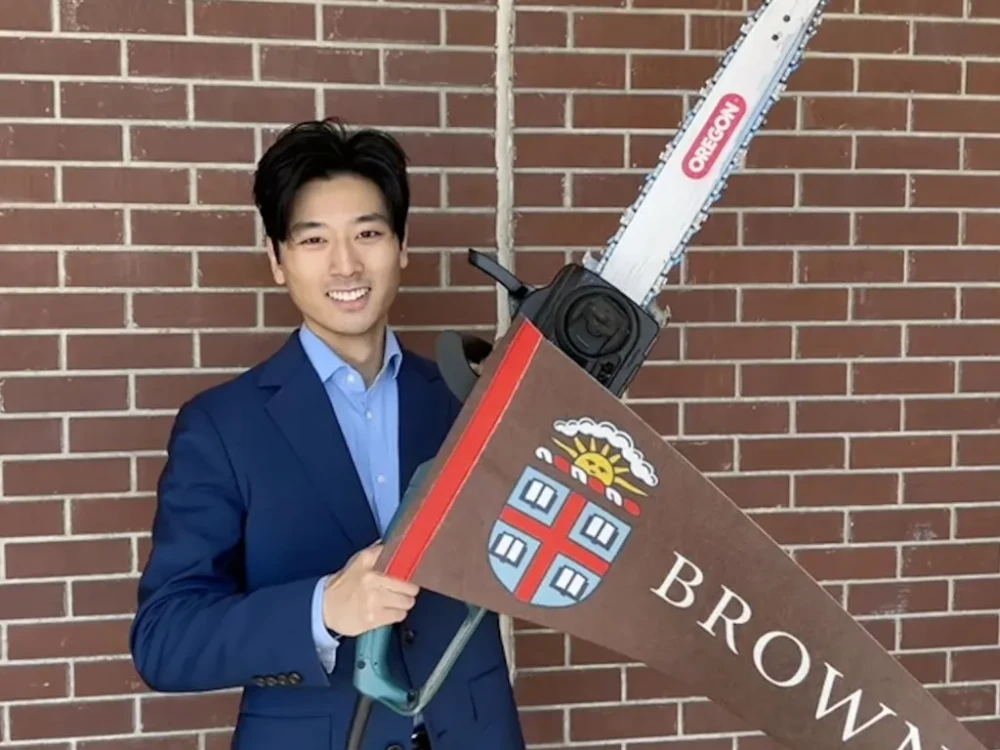Defiant and undaunted, Brown sophomore Alex Shieh celebrated the fact that he won’t be sent down for breaking university rules.
“I’m happy that I’m not being charged anymore, but I’m upset,” Shieh said. “I’m upset that I was charged in the first place.”
Earlier this year, Shieh used AI to scrape contact details of all non-faculty staff at Brown from various publicly available databases, such as LinkedIn. His Bloat@Brown database quickly grew to some 3,805 names.
“That’s one for every two undergraduates and twice the number of faculty members we have,” Shieh said.
At 8:30 in the morning on March 17, he sent out an email blast asking all of them to justify their jobs.
It said: “Could you please (1) explain your role, (2) describe what tasks you performed in the past week, (3) explain how Brown students would be impacted if your position was eliminated, and (4) comment on your current rating in our database and any areas of concern raised by the algorithm?”
Shieh said the email was part of his research for an article he was writing for a new conservative student newspaper, The Brown Spectator. His hypothesis was that administrative bloat was a big reason why it costs his family $93,000 a year to send him to Brown.
“I think the reason for this is not because of the professors; we know they’re underpaid,” he said. “It’s not because of the facilities; my dorm floods when it rains. It’s not any of these things. It’s these administrative jobs that have been growing since the 1990s.”
Shieh’s cheeky approach caught the eye of libertarian critics of elite colleges, including Elon Musk himself. Musk tweeted a one-word comment: “Wow”.
But Brown University officials were not amused.
In a prepared statement, Brown spokesman Brian Clark said at the time, “We advised employees, many of whom expressed concerns, not to respond, and evaluated the situation from a policy standpoint.”
The university eventually brought formal charges against Shieh and several other undergraduates associated with the Spectator. The dean of Brown’s Office of Student Conduct and Community Standards, Kirsten Wolfe, accused them of trademark infringement for using the word “Brown” in the name of their paper.
Had the university’s independent review found them responsible, they could have faced suspension.
Undaunted, Shieh pushed back, going so far as to produce a YouTube attack ad against his academic accuser.
He and his fellow students argued that Brown officials were punishing them for expressing a viewpoint they didn’t like.
“It’s very clear this phony trademark thing is a pretext to come after us for unfavorable reporting,” he said.
Citing federal law and university policy, school officials have repeatedly declined to comment on the specifics of the case. But in statements, the university insisted it “has proceeded in this matter in complete accordance with free expression guarantees and appropriate procedural safeguards.”
On Wednesday, as the academic year nears its end, Brown’s independent review process sided with Shieh, clearing him of the charges.
Shieh said, “I’m going to continue pushing this issue. I’m going to continue advocating for a reduction in bloat. And I’m going to advocate for big changes here at Brown to bring down the price of education and to create a place that is accountable.”
Brown, again, declined comment. But, in a statement, university spokesman Brian Clark defended the decision to charge the students.
“Despite continued public reporting framing this as a free speech issue, it absolutely is not,” he said in the statement. “Since the initiation of Brown’s review, that review has centered on investigating whether improper use of non-public Brown data or non-public data systems violated law or policy; whether deliberate targeting of individual employees violated law or policy; and whether violations to Brown’s misrepresentation or name use policies took place.”







